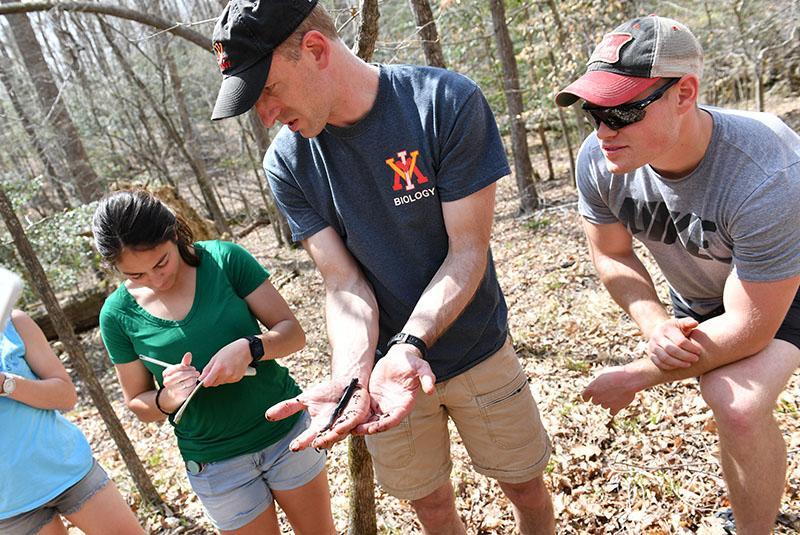Biology Class Treks through the Swamp

Lt. Col. Paul Moosman ’98 shows Bela Melendez ’20 and Hunter Sargent ’18 a salamander found in Pocahontas State Park in Chesterfield County April 14.—VMI Photo by Kelly Nye.
LEXINGTON, Va., May 2, 2018—Lt. Col. Paul Moosman ’98, associate professor of biology, led eight cadets from his vertebrate biology class into the swamps of Chesterfield County to look for reptiles and amphibians during an overnight trip April 14.
Moosman has been making the trip with cadets almost every year since 2011. They camp in Pocahontas State Park and look for species that are not found in the mountains, such as eels, aquatic salamanders, and even cottonmouth snakes.
“The goal is to expose the students to as many species as possible in preparation for a laboratory practical exam when we get back to post that will test their ability to identify the various species,” said Moosman. “But the other major goal is to simply get them out in the swamp so they can appreciate how amazing wetlands are.”
And despite the cold temperatures this spring, the class was successful in their finds. While hunting through the park they turned over logs and rooted through the mud. They found southern cricket frogs, a red spotted newt, a box turtle, and a worm snake among other things.
“Worrying about stepping on them makes you pay attention to little details,” said Moosman.
One of the first cadets to go on the field trip, Roy Hunter ’11, now joins the group as an alum allowing the cadets and Moosman to use his land in Chester to hunt through the swamp for cottonmouths at night. There they found a variety of frogs, eels, a swamp rat, and one cottonmouth.
“Everyone is afraid of this particular snake but the class gets to see in person how they have been given a bad rap,” said Moosman. “They are not aggressive, and beautiful actually.”
Hunter’s swamp, near the confluence of the James and Appomattox Rivers, is as far north on the east coast as Moosman has ever seen cottonmouths.
Several of the cadets who were hesitant about looking for the venomous snake in the wild, lost their reservations when they saw how non-aggressive the animal was.
“I didn’t realize that the cottonmouth was so calm,” said Samantha Fuller ’19. “Wild animals don’t really care about us as much as we all think.”
Another important aspect was learning about the terrain the animals live in. Moosman and Hunter led the cadets through the swamp with nets and headlamps, sometimes submerged above the waist.
“Most of the time you don’t get out in a swamp,” said Hunter Sargent ’18. “You take one step and you’re ankle deep, and then you’re chest deep in mud. Understanding how that environment is… and that’s how [the animals] thrive.”
Also assisting Moosman was Emily Kirk ’18. This was her second time attending the trip—this time as part of a teaching mentorship class. She loves getting out in the swamp.
“This is my favorite field trip I’ve ever been on,” she said. “It’s one thing to see them in textbooks but it’s another thing to see them in person.”
-Kelly Nye
-VMI-
.svg)
.png)